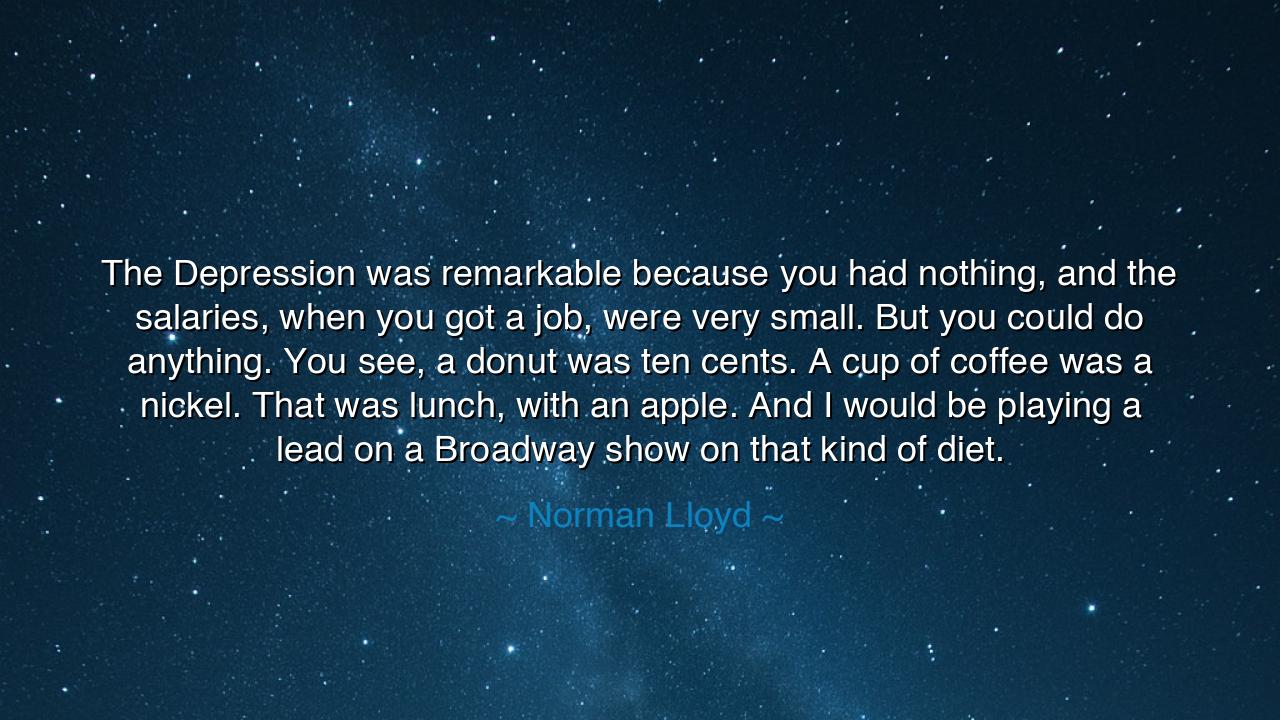
The Depression was remarkable because you had nothing, and the
The Depression was remarkable because you had nothing, and the salaries, when you got a job, were very small. But you could do anything. You see, a donut was ten cents. A cup of coffee was a nickel. That was lunch, with an apple. And I would be playing a lead on a Broadway show on that kind of diet.






"The Depression was remarkable because you had nothing, and the salaries, when you got a job, were very small. But you could do anything. You see, a donut was ten cents. A cup of coffee was a nickel. That was lunch, with an apple. And I would be playing a lead on a Broadway show on that kind of diet." These words, spoken by Norman Lloyd, carry within them a timeless lesson that speaks not only to the struggles of a particular era but to the resilience of the human spirit. The Great Depression—a time of scarcity, of hardship, and of profound suffering—was, in many ways, the crucible in which the strength of individuals and the will to persevere were tested and proven.
To understand the depth of Lloyd’s reflection, we must first grasp the nature of that time. The Depression was a period when the world seemed to crumble around those who had been touched by its ravages. Wealth was rare, employment scarce, and those who did find work often received a mere pittance. And yet, in the face of such adversity, people found a way to survive and even to thrive. Lloyd’s words reveal a truth that transcends the material: that when one has little, it is not the abundance of possessions that matters, but the strength of spirit and creativity.
Consider, for instance, the story of Victor Hugo, the great French writer who, in the early 19th century, found himself exiled and penniless. With nothing but his wits and his pen, Hugo wrote some of his greatest works, including Les Misérables, a masterpiece born out of hardship. He knew well that poverty was not a barrier to greatness, but merely a circumstance to be endured. Like Lloyd, Hugo understood that spirit was the true measure of wealth. Despite his material poverty, he produced art that would stand the test of time. The Depression may have stolen their comforts, but it could not strip them of their talent, their resolve, or their desire to create.
Lloyd’s story offers us another powerful insight. He speaks of living on a diet of simplicity, where a donut and coffee—mere pennies—became his sustenance. Yet, with that meager lunch, he was performing in one of the grandest stages of all, Broadway. There is wisdom here, for it teaches us that it is not the external comforts that shape a person’s destiny, but the inner fortitude to continue, to create, and to give life to one’s passion. How often do we, in times of abundance, look to external conditions—money, status, fame—as markers of success? But here, in the words of Lloyd, we see that even when stripped of material wealth, the true measure of success lies in the courage to follow one’s purpose, no matter the cost.
Let us recall the story of Abraham Lincoln, who, in the midst of personal and national turmoil, lived in a time of scarcity. Yet, despite his humble beginnings and the hardships he faced, he rose to become one of the greatest leaders in history. His determination to rise above his circumstances, his belief in the greater good, and his ability to inspire others led him through the darkest of times. Like Lloyd, Lincoln knew that the true value of a person lies not in their possessions but in their actions, their values, and their commitment to the greater cause.
The deeper lesson here is this: adversity is not the enemy—it is the forge in which our greatest strengths are formed. In times of deprivation, we are given the opportunity to discover who we truly are, to rise above external circumstances, and to create meaning from what is seemingly broken. The Depression taught many the vital importance of ingenuity, self-discipline, and community. It showed that when faced with scarcity, the human spirit can rise to heights that wealth alone could never bring.
What must we take from Lloyd’s words? In a world where comfort and abundance often cloud our understanding of success, we must remember that true wealth comes not from what we have, but from what we give. It is in our ability to persevere, to create, and to make meaning from the smallest of resources that we find our greatest potential. Whether we find ourselves in times of plenty or poverty, the challenge remains the same: to live with purpose, to rise to the occasion, and to make our lives count, no matter the circumstances.
So, as we walk our own paths, let us not be disheartened by the lack of external rewards or by the weight of hardship. Let us instead cultivate an inner strength, a resilience that transcends the material, a spirit that can thrive even in the most difficult of conditions. For in the end, it is not the luxuries we possess, but the richness of our hearts and the depth of our commitment to our craft that will define the legacy we leave behind. As Norman Lloyd’s words echo across time, let them remind us of the power of the human spirit to endure, to create, and to thrive.






AAdministratorAdministrator
Welcome, honored guests. Please leave a comment, we will respond soon